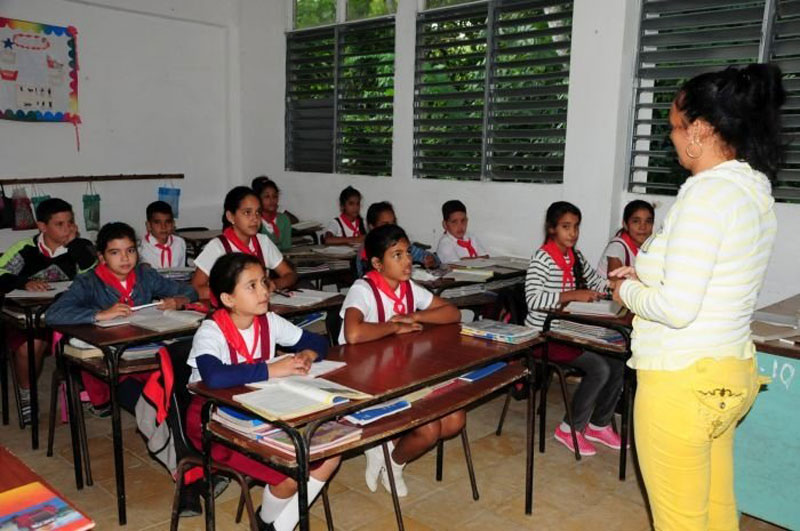



A class in Sancti Spiritus, Cuba.
like hundreds of thousands of other children and college students across Cuba, he arranged the notebooks, books, pencils and backpack that he will need to go to school.
"I am very excited because I want to see my friends and learn new things in this new school year," said Carlos, who starts sixth grade at Cesareo Fernandez Elementary School in the western Havana district of Miramar.
Officials have also been preparing for September 3, inspecting his school and the other 10,716 learning centers around the country, and putting together a curriculum that addresses contemporary issues.
"We are prepared to face a school year superior to the last, and with several challenges," including a shortage of teachers, Education Minister Ena Elsa Velazquez recently told local media.
"Providing a comprehensive education with high quality standards are the main guidelines," added Velazquez.
In the midst of great transformations, and new social and technological challenges, 1.7 million students will start elementary, middle and high school education, while at least 250,000 young pupils will study at national universities.
More than 156,000 teachers will teach preschools, primary and high schools, said the minister, adding that guaranteeing a teacher for each classroom continues to be a major concern.
"About 93 percent of teachers per classroom are guaranteed, while for the remaining 7 percent, there are alternatives such as retired teachers, specialists in production and services, and university students," Velazquez said.
Irene Rivera, deputy minister of education, said educators this year are set to tackle several sensitive subjects, including drug use.
"We are making an extraordinary effort with students to reject illegal conduct and socially disruptive behavior, with the stress on the illicit use of drugs," said Rivera.
This year, the Ministry of Education's goal is to turn schools into the cultural and social epicenters of each community, with the help and participation of parents, she said.
To update educational processes, the ministry's audiovisual services company CINESOFT has developed software to supplement traditional teaching methods with new technologies, such as mobile applications, according to Ivan Barreto, director of CINESOFT.
College enrollment could exceed a quarter of a million students, the minister of higher education, Jose Ramon Saborido, told the press this week.
"There is an increase of 14,000 students who passed their entrance exams to study five- and four-year careers," he said.
His agency wants to introduce a short-cycle higher education program for high school graduates who did not go on to earn a college degree.
"This initiative, which awaits the approval of its legal norms, was analyzed by the educational centers and authorities of each province and is in keeping with the economic and social development needs of each territory," the minister said.
So far, 25 specialties have been proposed for the short-cycle program, including administrator of computer networks.
"At the 22 Cuban universities, everything is ready to start the school period to contribute to graduating trained professional that work for the economic and social development of the country," Saborido said.
Cuba's government, in particular President Miguel Diaz-Canel, pays great attention to the educational sector and earmarks considerable material resources to ensure a quality education despite the economic hardships the Caribbean nation is facing, said Saborido.